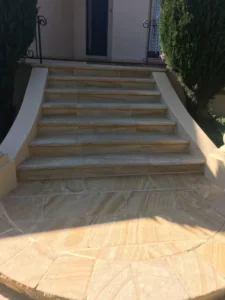STRIPPING AND SEALING FAQs
At Tile Cleaning Experts we specialise in tile stripping and sealing – especially for natural stone. Check out our Frequently Asked Questions to learn more about our tile stripping and sealing services. In our FAQS we have compiled the questions we get asked most frequently. Types of questions we get include why it is good to strip and seal your tiles, how long before you can use your floor after it has been stripped and sealed and how much will it cost.
If you have other questions relating to the tile stripping and sealing process contact us either by email or phone.
What is included in your stripping and sealing service?
Once any previous sealer has been removed from the area, the floor is thoroughly cleaned and neutralised. This means that it is free from dust, residue and anything that may affect the new coat of sealant. We mix the sealing solutions to suit the floor type and location of the floor, then apply the sealer using state-of-the-art machinery. We then advise of drying time, which is touch dry in 4 hours and completely dry in 24 – 48 hours.
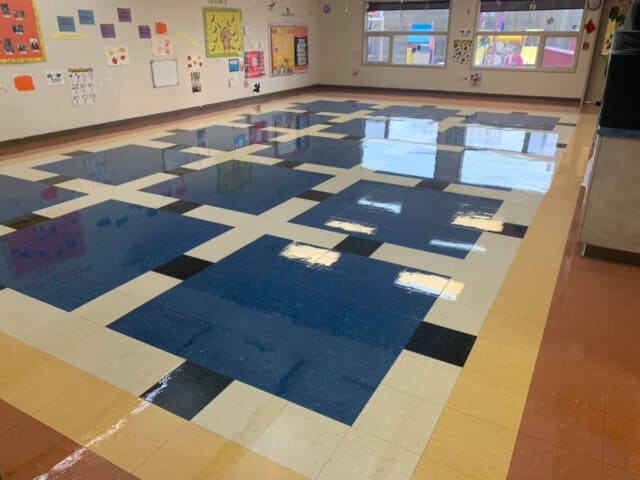
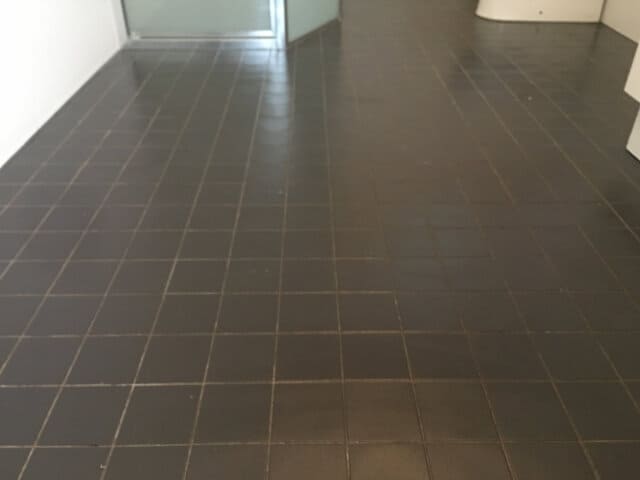
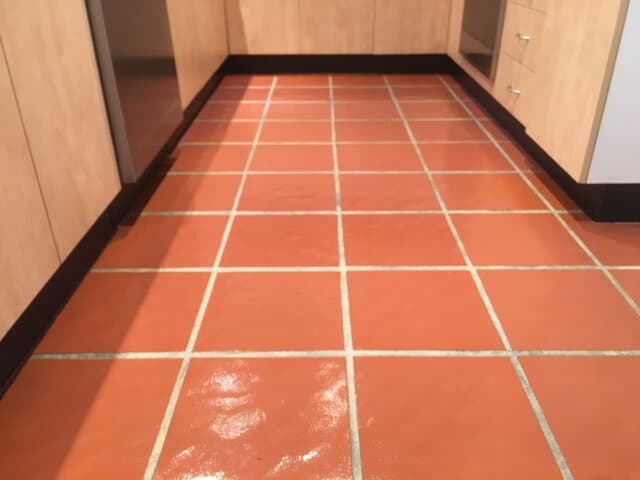
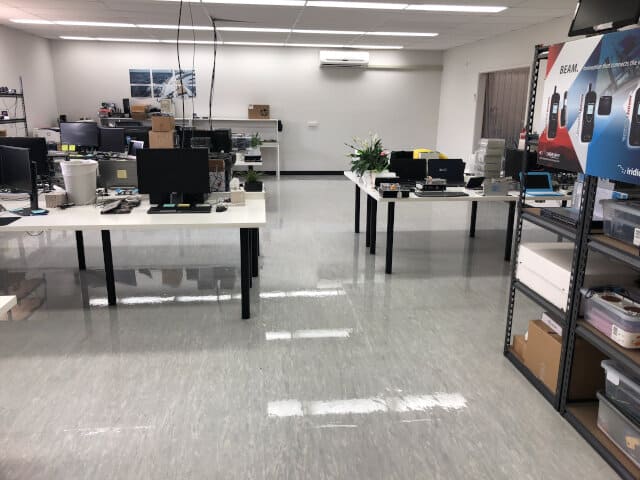
Why should I strip and seal my tiles?
Whether inside or out, natural or manmade tiles can deteriorate, stain or discolour due to sun-exposure, weather elements, chemicals and other impurities such as grease, acids (even found in household foods), salt, etc. This can results in common problems, such as cracking, discolourations, efflorescence (a crystalline, white-like deposit on the tile surface), pitting or corrosion, spalling, etching, delamination, etc. All flooring is porous, to varying degrees, and what may seem like an innocent spill, even if cleaned immediately, can penetrate the porous properties and permanently stain. The stripping component removes any existing coating, to ensure that we have a ‘fresh canvas’ to work with. It avoids any patchy work from areas that may have worn down more than other (for this reason we do not recommend sealing over existing, old sealer). It’s also important to know the existing sealer on the floor, which our experts will determine if you don’t know. Our technicians will know exactly how solutions will react with the floor properties and existing sealer, and prevent hash chemicals damaging your expensive flooring. By sealing, you are providing an invisible protective layer against elements that may result in tile and grout damage, assist with regular maintenance – making it easier to clean, preventing bacteria, and slow the process of dirt build-up and mould. Grout sealing prevents moisture from working its way into the grout and under the tiles.
Do I need a professional to apply sealer. Can’t I have you clean and then seal myself?
While there are DIY sealants on the market, having a professional seal your floor and tiles ensure that the correct sealer is applied. It takes into account the properties of the stone or hard surface you have, the area in which the sealer will be and how much foot-traffic it will receive, as well as the desired finish you want. If you consider how much you paid for the original flooring to be laid, having a professional ensure that sealer is applied according to industry standards and is professionally cleaned prior to sealing, ensures the best outcome for your investment and avoids the risk of damaging them or doing a substantial job with home-solutions. Sealing over any blemishes or dirt will lock in those impurities, which can make it challenging for anyone using DIY methods. 25% of the work we do is correcting DIY sealer applications. Either the wrong sealer has been used or the sealant has been incorrectly applied and fails, causing it to lift or peel.
Does sealing my tiles and grout guarantee that they won't become stained?
Sealing your tiles and grout is a preventative measure against dirt penetration and build-up, bacteria, staining and eroding. It means that should you spill something you have time to clean it but it does not guarantee that they are stain proof.
Does sealer change the look of my floor?
The type of sealer used to protect your floors is a big factor when it comes to the look of your floor. We have transparent sealer options where there is no difference to the look when compared to the original tiles and there are sealers that provide a completely wet looking finish. Topical sealers come in different varieties such as a gloss, satin or a matte finish. All sealers are protective coatings with different lifetime expectancies and will encourage the natural elements of your floor to show through.
How long can I expect you to be at my home/office?
Depending on the size of the area and how much work is necessary in order to restore your floor to its best possible condition; times may vary from initial estimates. In most cases the average job takes 3-4 hours. Once our technician has inspected the area and done a sample, they will give you a more accurate indication of how long the work will take.
How long does it take for the sealer to dry?
Most sealers (both penetrating and topical) are touch-dry after 4 hours. However, it can take 24 – 48 hours for the sealer to fully cure. Our experts will advise on dry times when completing the job.
How is your service charged?
All flooring specialists charge per square meter. We will ask you for an estimate of the area size when booking over the phone and our experts will measure each room individually and confirm the dimensions and work prior to starting the job.
What tiles and stone types are do you specialise in?
We’re experts in all hard surface,natural and manmade tile areas. Some common types we service (but are not limited to) are: ceramic, slate, limestone, travertine, sandstone, bluestone, terracotta, marble, granite, terrazzo, vinyl, concrete and porcelain. You can read more about the properties of these under ‘types of floors’
How do I organise a quote and how long will it take?
Simply, fill in our ‘free online quote’ section and a team member will contact you with the details you provide. In most cases, we can easily provide a quote to you over the phone within 5 – 10 minutes, answering any questions or concerns that you may have. On the day, Tile Cleaning Experts will inspect the area and confirm the quote before starting.
How do I measure the area that needs to be stripped and sealed?
When quoting over the phone, the simplest way to measure the area is to multiply the width and length of the area to be cleaned. E.g. A room that is 2 meters long and 4 meters wide would be 4 x 2 = 8m2 in total. Our experts will determine the exact dimensions when on site and confirm before they start any work In rare cases, we may need to attend the location to provide a quote. This can be discussed with you over the phone.
Do I need a professional to strip and seal?
While you can strip and seal your own floors, we do this daily (multiple times a day). We know how properties react with your floor or surface areas and will be able to determine on the day after examining the floor the correct stripper and sealer required. We take into account the floors natural properties, the area in which the sealer will be and how much foot-traffic it will receive, as well as the desired finish you want. If you consider how much you paid for the original flooring to be laid, having a professional ensures that sealer is applied according to industry standards and is professionally cleaned prior to sealing, ensures the best outcome for your investment and avoids the risk of damaging them or doing a substantial job with home-solutions. Sealing over any blemishes or dirt will lock in those impurities, which can make it challenging for anyone using DIY methods. If your floor has previously been sealed with solvent (a hazardous chemical previously used in the industry), it’s important that this is removed by a professional with the correct precautionary equipment and experience. We will advise you if your floor has a solvent coating on it. In circumstances where you would like solvent-based sealer applied, we require specific precautionary measures, which you will be made aware of prior to attending the job. This consists of the premises being cleared for a certain amount of time after application and adequate ventilation. Our experts will ensure a high-level of safety and protection is used during this certain type of sealing process.
What type of stripper and sealer do you use?
Our experts will determine the best stripper and sealer for the floor type. This will be based on the aesthetics and functionality of the area e.g. if it’s a high-traffic area. Plus, our experts will take into account the floor type, as well as your budget. If your floor has previously been sealed with solvent (a hazardous chemical previously used in the industry), it’s important that this is removed by a professional with the correct precautionary equipment and experience. We will advise you if your floor has a solvent coating on it. Topical sealers generally last 3 years, while impregnating sealers can last up to 15 years. On walls, pillars and other vertical surfaces, impregnating sealers could last a lifetime. However, areas such as entrance ways and shower recesses, or office and commercial properties, where there is heavy foot traffic, the lifetime of the sealer is reduced. Aesthetically, we will discuss your desire for a gloss or matte-based finish, which again will determine the type of sealer our experts use.
What is a sealer?
A sealer is a liquid, containing a type of resin that is applied to a substrate that provides a protective film or barrier from stains, dirt, bacteria and deterioration as well as enabling you to achieve a better result when cleaning the surface. This barrier or film prevents liquids and dirt particles from absorbing or sinking in.
How long does sealer last?
While it depends on the quality of the sealer and the amount of foot-traffic, topical sealers generally last 3 years, while impregnating sealers can last up to 15 years. On walls, pillars and other vertical surfaces, impregnating sealers could last a lifetime. However, areas such as entrance ways and shower recesses, or office and commercial properties, where there is heavy foot traffic, the area should be checked and services more regularly.
Can I seal just my grout lines?
Of course you can. While tilers and manufacturers state that their tiles are sealed, they usually use either a budget sealer or have sealed the floors incorrectly. Because sealing any surface is a specialised industry in itself, manufacturers aren’t experts in floor sealing and restoration. Grout sealing prevents moisture from working its way into the grout and under the tiles. It also prevents bacteria, dirt build-up, stain and mould or mildew, assisting in keeping the grout looking near-new.
How long does it take for the sealer to dry?
Most sealers (both penetrating and topical) are touch-dry after 4 hours. However, it can take 24 – 48 hours for the sealer to fully cure. Our experts will advise on dry times when completing the job.
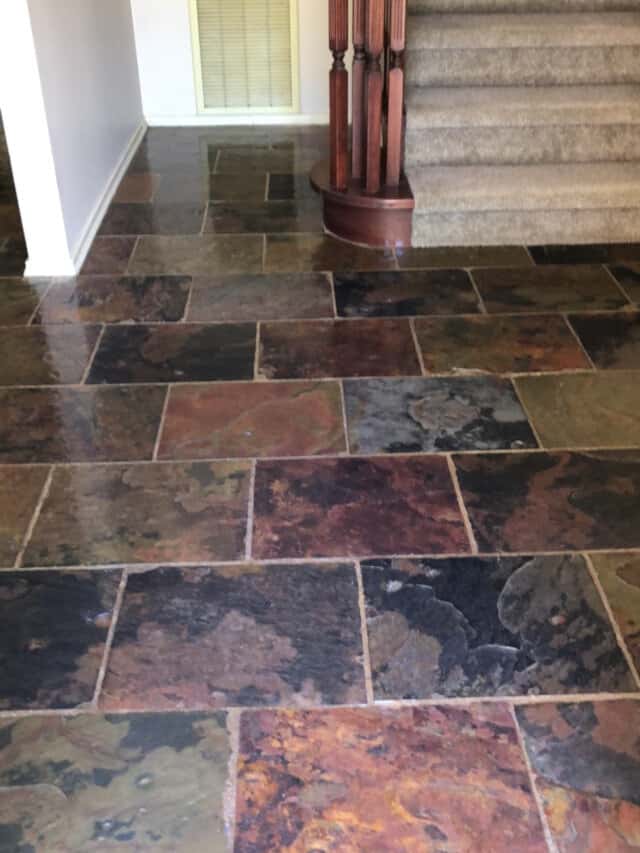
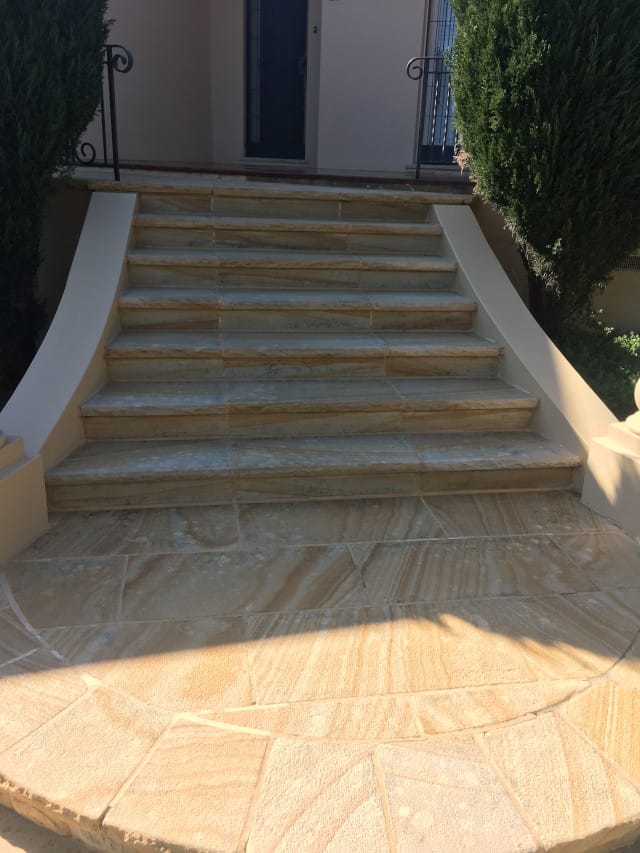
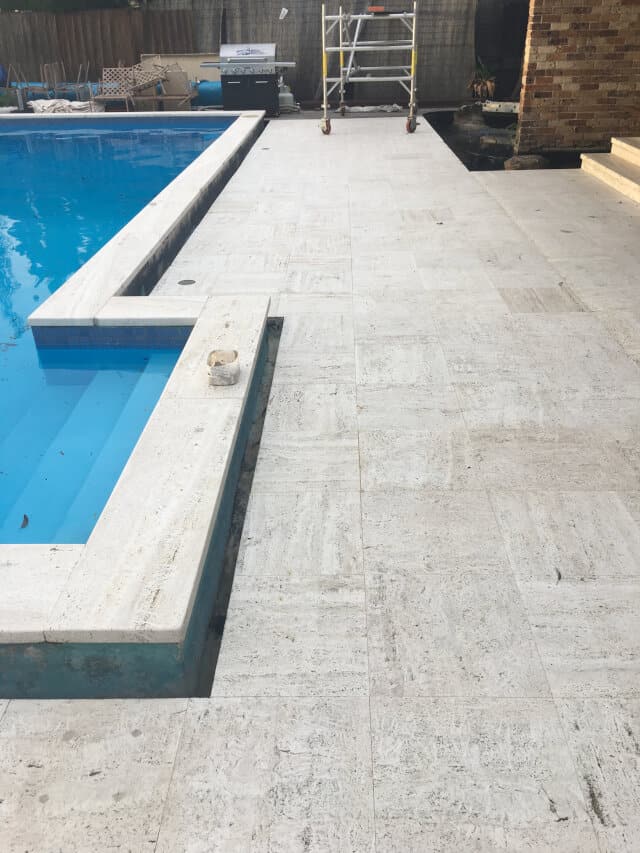
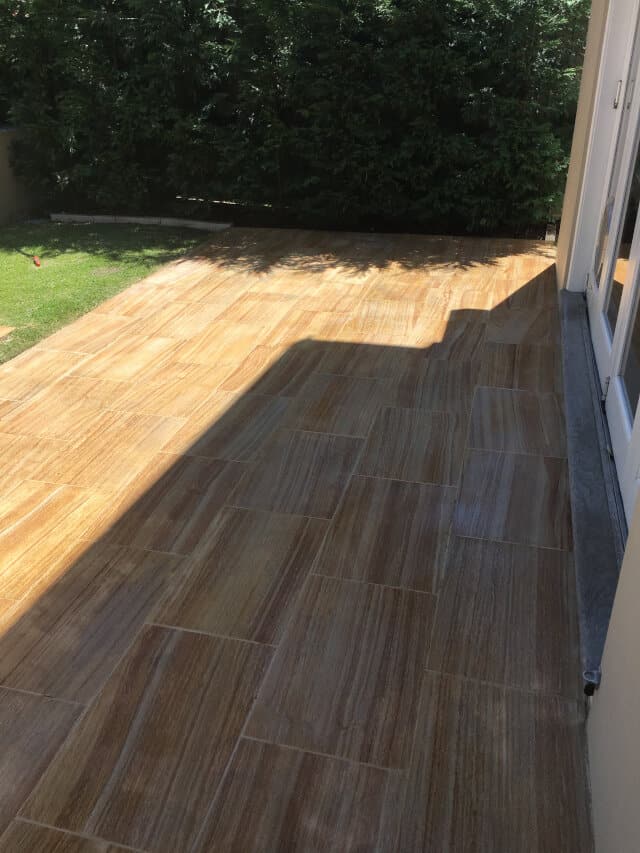
Can penetrating sealers be applied over the top of topical sealers?
Unfortunately, they can’t. Topical sealers create a membrane or film-like barrier that prevents the absorption of stains and dirt. If you wish to apply a penetrating sealer we recommend that you get a professional to remove the existing topical sealer and apply the new sealer (known as stripping and sealing). We also don’t recommend applying new sealant over older coatings, as some areas may be more worn than others and will show. We find some of our new customers have had several coats of sealer applied through other companies. This detracts from the qualities of your floor and it’s always recommended that you strip and reseal the floors.
How do I determine when to next seal my floors, tiles or other hard surface area?
When your tiles or flooring still looks dull or matte, even after you’ve given them a sufficient regular clean or if you notice that stains aren’t lifting as easily as they once did, it indicates the previous sealer is wearing off. We recommend a professional resealing your floors immediately to prevent permanent staining and protect the longevity of your floors
How should I clean my tiles and grout once sealed?
Tile Cleaning Experts also recommends cleaning weekly with a damp microfiber cloth mixed with pH netural solutions. We do not recommend a stronger solution for your regular weekly cleaning, as both acidic and alkaline based cleaners may affect the integrity of the sealer and can damage the material. For outdoor areas, you can clean as normal – using a broom or hose to remove debris and keep tidy. We do not recommend using any harsh chemicals as it can strip the sealant coating. We also recommend weeding the pathways to ensure weeds are kept at bay and pavers and grout lines aren’t cracked by larger weeds or made uneven. Weeds also hold moisture, which creates an environment for mould to flourish in.
Are the chemicals used to strip and seal my floor toxic?
Your family, workers and customers’ safety is important, which is why we use the highest quality water-based sealers, as well of state-of-the-art machines and equipment. If your floor has previously been sealed with solvent (a hazardous chemical previously used in the industry), it’s important that this is removed by a professional with the correct precautionary equipment and experience. We will advise you if your floor has a solvent coating on it. In circumstances where you would like solvent-based sealer applied, we require specific precautionary measures, which you will be made aware of prior to attending the job. This consists of the premises being cleared for a certain amount of time after application and adequate ventilation. Our experts will ensure a high-level of safety and protection is used during this certain type of sealing process.
Will there be a lot of mess when stripping and sealing my tiles and grout?
Water-based sealer is not messy and won’t damage your floors or other areas of your home. If your floor has previously been sealed with solvent (a hazardous chemical previously used in the industry), it’s important that this is removed by a professional with the correct precautionary equipment and experience. We will advise you if your floor has a solvent coating on it.
How many coats of sealer do you apply?
We apply anywhere between 1 – 4 coats of sealer. This will depend on several factors, such as the type of tile you have, where it is in the home or property and how much foot-traffic there is there, whether it’s inside or outside, and what finish you desire.
I have efflorescence build up, will sealing prevent it?
In a word – yes. Efflorescence (a crystalline, white-like deposit on the tile surface or grout lines) often appears on outdoor tile surfaces and areas that are prone to being wet . It’s formed from water bringing the minerals found underneath the tile surface to the top. Once the water evaporates, a whitish coating appears on the tile. It can be removed with specialised cleaning techniques, but it normally caused by a leakage causing water to travel beneath the tiles. It’s therefore important that the cause of the efflorescence problem is resolved. We also recommend having a professional seal it with the highest-quality penetrative water-resistant sealer to stop any more water from penetrating the tiles and grout.
How long can I expect you to be at my home/office?
Depending on the size of the area and how much work is necessary in order to restore your floor to its best possible condition; times may vary from initial estimates. In most cases the average job takes 3-4 hours. Once our technician has inspected the area and done a sample, they will give you a more accurate indication of how long the work will take.
How long until I can use the floors as normal again?
After a clean of your tiles and grout, the floor is ready to use as soon as we are done.
Does sealing my tiles and grout guarantee that they won't become stained?
Sealing your tiles and grout is a preventative measure against dirt penetration and build-up, bacteria, staining and eroding. It means that should you spill something you have time to clean it but it does not guarantee that they are stain proof.
Does sealer change the look of my floor?
Generally, it does not, however, multiple coats and the desire for a gloss or matte finish may change it ever-so-slightly. Sealer is a clear coating that protects and still encourages the natural elements of your floor or tiles to show through.
How can I prepare for a professional to come?
We ask that you move all furniture and items in the area to be cleaned, as well as any obstructing furniture between the main entrance point and the area to be cleaned to allow for our professional equipment and machines. A quick vacuum is appreciated to remove any loose dirt, dust and hair. We also recommend painter’s tape on cornices that may come into contact with the industrial hose (as a precautionary). You can read more about this in our blog section.
Will you help me move my furniture?
We ask that you clear the area that Tile Cleaning Experts is cleaning. Tile Cleaning Experts insurance coverage means we are only covered by our restoration services and cannot be held responsible for the damage to any furniture or items.
What are your hours and availability?
We understand that everyone’s schedule is a little different, so we are flexible in the hours that we work. Generally speaking, we work Monday – Saturday between 7am and 5pm. However, there is no additional charge for after-hours services. Our technicians can usually attend the property within 2 – 10 days from making the booking at a time that suits you.
What are your hours and availability?
We understand that everyone’s schedule is a little different, so we are flexible in the hours that we work. Generally speaking, we work Monday – Saturday between 7am and 5pm. However, there is no additional charge for after-hours services. Our technicians can usually attend the property within 2 – 10 days from making the booking at a time that suits you.
Is there a call out fee?
As our expert technicians are travelling to your premises, our call out fee is inline with industry standards, which is charged at $75 + GST if the job does not go ahead.
Is there a minimum charge?
We have a minimum charge of $250 + GST for all metro jobs. This is inline with standard industry rates.
LET US HELP
Our tile cleaning experts go that extra step and advise you on the best method and products to maintain your shiny and clean newly sealed floors.
Contact us today for a free online quote.
